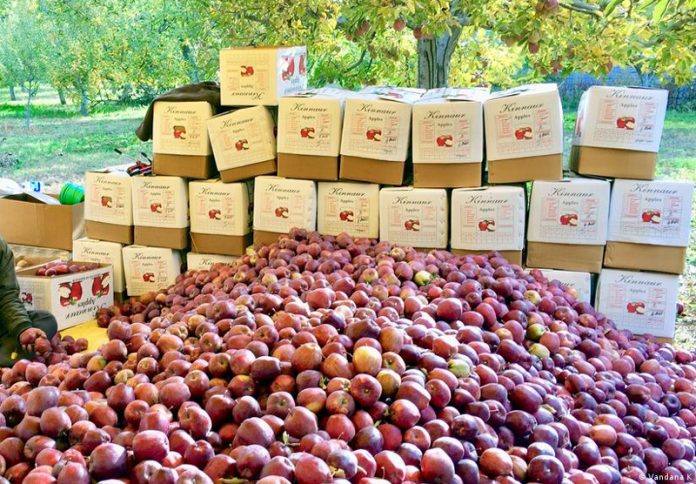Suhail Bhat
Srinagar, Oct 23: The increased weather variability resulting from climate change has taken a toll on apples in Kashmir this year leading to a drop 40-50 percent in production.
According to apple growers who spoke to Excelsior, the weather fluctuations this year affected the crop at various stages of development, leading to a decline in both the quantity and quality of the crop. This has dealt a severe blow to the apple industry, which is considered the backbone of the region’s economy.
“I think production has dropped by nearly 60 percent, as the whole season was unfavorable for the crop. For example, when we needed the right temperature, it was low, and when a low temperature was needed, it was high. The weather behaved strangely this year, and that has greatly affected the growers,” said Abdul Basit, a grower from Shopian.
He pointed out that the orchardists who typically received 1000 boxes of apples now only get 300-400 boxes, and even those are of undesirable quality.
While explaining the phenomenon, Sameera Qayoom, an agro-meteorologist at the SKUAST, said that abnormal weather behaviour throughout the season was responsible for the drop in the quality and quantity of the crop. She mentioned that, from flowering to fruit development, the weather behaved unfavourably.
“During flowering, the temperature dropped, and pollination did not take place as bee activity decreased in low temperatures,” she said. She also noted that an increase in rainfall in May led to the spread of primary scab, severely affecting the crop.
“This was followed by a dry period that reduced cell elongation, affecting the size of the fruit. When the fruit developed, there was extreme heat in September, which affected the colour of the fruit, giving it a crusty brown outer layer and making the apples appear bruised, which is unacceptable in the market,” she said.
However, Sameera believes that climate variability is likely to be a permanent feature in the region, and farmers need to stay updated with weather apps like Meghdoot to receive information about microclimatic conditions in their respective areas and devise strategies accordingly. “More awareness is needed, and with the help of this app, farmers can stay informed about the ever-changing weather conditions,” she said.
Bashir Ahmad, the President of the Kashmir Fruit Growers Association, told Excelsior that production is down by 40 percent and the percentage of A-grade apples has also significantly reduced. “For example, if we used to receive an average of 2000 apple trucks at the Parimpora fruit market, we now only receive 500-600 trucks. The number of A-grade apples has also decreased, and there are more C- and D-grade apples this year. The damage from diseases was also more severe this year,” he said.
Trending Now
E-Paper


